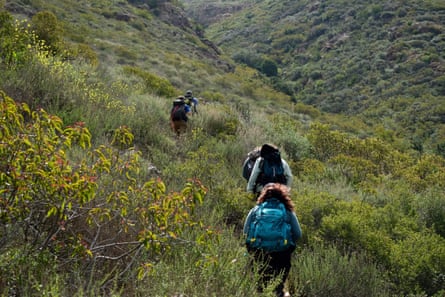Osvaldo Ruiz and a friend were hiking through an isolated stretch of mountains, just a few miles from the sprawling US-Mexico border wall that fringes San Diego, when the federal agent stopped them in their tracks.
It was late March, mid-morning, and Ruiz, who works for a local non-profit called Border Angels, was busy. That day he was scouting a new route where his group could leave life-saving water and food for the sporadic waves of migrants who still cross through these desolate borderlands. Ruiz and his friend, a fellow Border Angels member, already knew they were being watched. A helicopter had been buzzing overhead for the past several hours, tracking them.
Shortly after the duo sat down for a mid-hike coffee break, the border patrol agent appeared on the trail. Four or five other officers lagged behind him in the distance.
The first agent seemed disappointed that the two weren’t migrants crossing the border illegally.
“Oh, I thought you all were ‘customers’,” he said as he got closer, referring to migrants who travel through the area.

Ruiz reiterated that they were not.
“We got excited,” the border agent told them, according to Ruiz. “Daddy Trump has been doing a good job so it’s been slow.”
That type of politically charged interaction has not been uncommon in the nation’s borderlands over the last few months. And for the network of non-profits across southern California that seek to help migrants and asylum seekers, the prevailing atmosphere has often felt more intense and angry since the Trump administration launched its crackdown on immigration across the southern border.
Groups like Border Angels have been on the frontlines of that change. During their monthly hikes to drop water and food for migrants, interactions with border patrol (some tense, others more neutral) have become a regular occurrence. Pre-Trump, some Border Angels volunteers said they rarely saw agents in these remote areas. The supplies they leave have also been vandalized on many occasions, although the culprits are unclear. Once, someone hurled a large boulder into a crate of water and left a hand-written note in Spanish: “America siempre” (or “America always”). And since Trump’s inauguration, the non-profit has been receiving a more consistent flow of nasty messages and emails from the public.
“There has been a lot more open hate around the work that we do,” Ruiz said.
But the need is still there. If migrants can’t find basic aid while passing through California’s backcountry, the region’s near-freezing winter nights, triple-digit summer days and perpetually harsh terrain can lead to injuries and even death.
Although the number of people crossing into the US illegally has plummeted dramatically from this time last year, some have continued to take the risk. This March alone, more than 1,300 migrants were apprehended between official ports of entry in California. That same month, three people died while attempting to cross in the same wilderness area Ruiz had been hiking through. More people have been apprehended in the San Diego sector than any other section of the southern border this fiscal year.
But for many people seeking asylum from outside of the country, there is virtually no way to legally enter the United States right now. A government mobile app called CBP One, where migrants were previously able to schedule an appointment with immigration officials, was shut down for that purpose in January by Trump.

Melissa Shepard, director of legal services for the non-profit law firm Immigrant Defenders Law Center, said she had been forced to have very difficult conversations with asylum seekers who are waiting in limbo. Recently, at a migrant shelter in Tijuana, she met a mother of two whose husband had just been killed in their home town. After his death, the woman fled to the border. Shepard had to break the news that, at least for now, there is no path forward for her and her children.
“At this point,” Shepard said, “unfortunately there are no real means for them to enter the US lawfully to seek asylum.”
The lack of legal options also opens the door for coyotes and smugglers, who approach migrants in Tijuana and offer to help them cross the border. Someone desperate enough may take that option, Shepard said, especially considering the fact that migrants are still able to apply for asylum if they are physically in the US – whether or not they’ve entered legally.
“People are fleeing really desperate situations, and I think if the opportunity presents itself, they’re willing to take that risk,” Shepard said. “We’ve seen it over and over again that despite these harsh policies that are put into place, deterrence is not effective.”
Signs of survival: from inhalers to handcuffs
One recent weekend in April, a pack of volunteers with Border Angels ventured out on one of their monthly water-drop hikes, in the same mountains where Ruiz had run into border patrol the month before. The volunteers carried heavy-duty camping backpacks loaded with bottles of water, Gatorade, hand warmers, emergency blankets and little tins of canned sausage and tuna fish.
As they trekked deeper into the wilderness, off the designated dirt trail and into dense vegetation, there were signs of people crossing – and struggling to survive – everywhere. In some dugout-like areas protected from view by trees, probably used as resting spots for different groups of migrants, there were layers upon layers of discarded clothes, shoes, hats and backpacks (once people get closer to civilization, they often cast off dirty clothing that could expose them as having just crossed the border, the volunteers explained).
Because Border Angels dates each can of food or bottle of water they leave, it was also clear that some supplies had been consumed recently; one volunteer held up an empty can of tuna, dated 22 February.

But other items left along the route told more harrowing stories, ones that the volunteers will never be able to fully piece together. They spotted an inhaler left in one patch of dirt, then a bottle of baby powder. In a thicket of bushes off the beaten path, a pair of handcuffs were found clasped around a branch. Ruiz and another Border Angels member crouched down near the handcuffs, trying to determine what could have happened there. Maybe a smuggler had ditched them?
“We just don’t know,” Ruiz said.
As always, the group of hikers knew that immigration officials could be aware of their movements; this heavily surveilled slice of the border is constantly being watched. Nearby, closer to the border wall, hi-tech autonomous surveillance towers and drones monitor the area around the clock. Trump recently proposed increasing the Department of Homeland Security’s budget for next fiscal year by nearly $44bn, a portion of which would go towards further increasing the border’s security technology.
About two hours into the hike, as if on cue, a helicopter with US Customs and Border Protection flew by overhead.
“They there are,” Ruiz yelled over the whirring. “We may have triggered one of the sensors, the cameras.”
Some of the Border Angels volunteers had experienced all of this before, but others were on their first hike with the group. One of them, Belen Hernandez, had driven an hour and a half from Orange county that morning to be there, carrying four big bottles of water and other supplies on her back.
Hernandez, who works as a law clerk with an immigration law firm, said she had been on a professional rollercoaster for the last near-decade. On her first day as a legal assistant back in September 2017, during Trump’s first presidency, his administration moved to terminate the Daca policy, or Deferred Action for Childhood Arrivals.

Now, things seem to be moving faster and faster, she said. Within the legal system, Hernandez often feels her hands are tied in terms of her ability to help migrants, including extremely vulnerable groups like unaccompanied minors – they either qualify for status in the US or they don’t.
But out in the borderlands, helping feels a little simpler.
“Even though I work in immigration, I can’t necessarily give everyone a green card, or some type of status,” Hernandez said, while readying her backpack for the second, uphill portion of the hike.
“But this is at least one thing I can do, which is: ‘Here, you made it this far. Let me get you a little further by giving you food and water.’”

 6 hours ago
6
6 hours ago
6













































